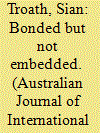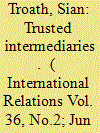|
|
|
Sort Order |
|
|
|
Items / Page
|
|
|
|
|
|
|
| Srl | Item |
| 1 |
ID:
165203


|
|
|
|
|
| Summary/Abstract |
The aim of this article is to use theories of bonded and embedded trust to explain the ‘roller-coaster’ nature of the Australia-Indonesia relationship. An examination of Prime Minister Keating and President Suharto as a case of bonded trust between leaders reveals the value such a relationship has in building trust in bilateral relations. However, it also reveals that such trust cannot survive changes in leadership if it has not become more broadly embedded in both government and society. This is particularly problematic given Australia’s tendency for rapid leadership and ministerial turnover across the past decade. While President Joko Widodo and Prime Minister Turnbull were able to develop a warm relationship which helped to reset the relationship and enabled them to navigate diplomatic incidents, Malcolm Turnbull’s recent political demise only serves to further highlight the necessity of building trust between societies. Without trust, cooperation between the two states will be limited. Building trust between societies will be required if Australia wants to develop a trusting relationship with Indonesia capable of undertaking deeper forms of cooperation on more sensitive issues – something which will be fundamental to Australia’s ability to navigate growing strategic uncertainty in the region.
|
|
|
|
|
|
|
|
|
|
|
|
|
|
|
|
| 2 |
ID:
191828


|
|
|
|
|
| Summary/Abstract |
Robotics and autonomous systems (RAS) are amongst a plethora of new and emerging technologies states are seeking to develop and use to gain military advantage in an environment of intensifying strategic competition. Australia is a key player when it comes to autonomous systems, with trusted autonomous systems (TAS) being earmarked as a priority area. RAS have taken an increasingly prevalent place in Australian research, discourse, military thinking, and defence industry. How Australia thinks about these technologies reveals important insights into their broader defence and strategic outlook, including their understanding of how the character of warfare is changing, and their approach to alliances and partnerships. In this article, I will trace how TAS became a priority area for defence in Australia, and provide a stocktake of the key developments in RAS which have taken place since 2016. This will include key actors, funding, discourses, and technologies. Taking stock of RAS in Australia reveals several key themes which stand out: the centrality of the concept of control, trust, ethics, interoperability, keeping ahead of adversaries, reducing danger to defence personnel, and developing systems which are cheap, small, and single-use.
|
|
|
|
|
|
|
|
|
|
|
|
|
|
|
|
| 3 |
ID:
185162


|
|
|
|
|
| Summary/Abstract |
Studying trust at the international level is one of the greatest challenges for trust studies. In this article I seek to expand on work which has sought to study trust between states in a way which avoids anthropomorphising the state, and retains the salience of interpersonal trust. To do this, I consider trust between states as existing in a web of relationships, from relationships between government figures, to military personnel, to members of society. In this article I demonstrate the value of incorporating actors beyond leaders in the most minimal sense: through including boundary spanners, those whose relationships and interactions span across boundaries, whether those boundaries be state borders or segments of government and society. Furthermore, I seek to begin a process of categorising the types of roles that boundary spanners can play in the development of trust between states. To illustrate their impact, I deploy a multidimensional approach to trust which is used to assess the relationship between leaders, and the impact of intermediary figures on both trust between the leaders, and in the relationships developed between the intermediary and their respective leader. One case study is used to exemplify the utility of this approach: the relationship between Harold Macmillan and John F. Kennedy and their respective official ambassadors David Ormsby-Gore and David Bruce.
|
|
|
|
|
|
|
|
|
|
|
|
|
|
|
|
|
|
|
|
|